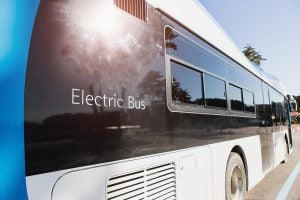Texas cities and fleet owners should take a closer look at electric buses
 Last month, the city of Houston announced the formation of EVolve Houston, a partnership focused on accelerating the adoption of electric vehicles, slashing transportation-related emissions and delivering cleaner air for the region. Considering Houston has some of the highest per capita greenhouse gas emissions in the country and nearly half of these emissions come from transportation, this strategy is a critical component for meeting ambitious climate goals and improving quality of life.
Last month, the city of Houston announced the formation of EVolve Houston, a partnership focused on accelerating the adoption of electric vehicles, slashing transportation-related emissions and delivering cleaner air for the region. Considering Houston has some of the highest per capita greenhouse gas emissions in the country and nearly half of these emissions come from transportation, this strategy is a critical component for meeting ambitious climate goals and improving quality of life.
As the Energy Capital of the World goes electric with the goal of 30% of new car sales being EVs by 2030, cities, transit agencies and fleet owners across the state should also consider how investing in electric buses presents an opportunity to cut pollution, deliver on climate goals and generate economic benefits.
EVolve Houston will be hosting a fleet electrification workshop on Nov. 6, which will offer fleet owners a chance to learn how going electric can benefit their bottom lines and the communities they serve.
Texas cities and fleet owners should take a closer look at electric buses Share on XWe’ve all been caught in a city bus’s cloud of exhaust as it takes off from a standstill. Diesel buses emit harmful pollutants and contribute to ozone, an air pollutant that forms smog and triggers health problems like asthma. Natural gas buses also emit these pollutants and increase climate emissions for decades compared to diesel buses. Fortunately, by transitioning to electric buses we can cut climate emissions and stop the local pollution emitted every time a bus rolls through our cities, by our places of work and near our kids’ schools.
Electric buses can also help cut down on costs. Although they currently have a higher sticker price than their diesel or natural gas counterparts, fuel and maintenance savings have the potential to outweigh upfront capital costs and deliver a stronger return on investment over the vehicle’s lifetime.
Because battery electric vehicles have fewer moving parts, there are fewer things that need repair or replacement. This, and the fact that less preventative maintenance is needed for items like breaks, can help keep maintenance costs down over time. Charging an electric vehicle is also less expensive than fueling one powered by an internal combustion engine, and electricity prices have the added benefit of generally being more stable.
Texas fleet owners are increasingly convinced the value proposition behind electric buses is worth considering. Electric bus pilots have been launched in Austin, Bryan/College Station, Ft. Worth and Houston, and according to Capital Metro, “the use of innovative technology like electric vehicles allows us to create a more efficient, quiet and sustainable transportation system.” Capital Metro’s buy-in is on full display at an old mattress factory, which the agency is “knocking down… to build the bus fleet facility of the future.”
Aside from being quick, quiet and cost-saving, electric buses also have the potential to provide added grid stability in Texas — that’s a plus for fleet owners and electric providers. When demand for mobility is low and demand on the grid is high, some types of vehicles with compatible use patterns, like school buses that run only during set times, will be able to return stored electricity back to the grid.
That added resilience is critical as the state faces the impacts of a changing climate, which poses a serious threat to Texas’ economy and municipalities. Austin, Dallas, Houston and San Antonio are all committed to the goals of the Paris Agreement, and the science is clear that major cuts in transit emissions are needed to meet those targets.
The good news is that adaptation offers a chance to create new value. As fleet owners invest in new vehicles, those investments can support lasting solutions that benefit the bottom line and our state’s future.










